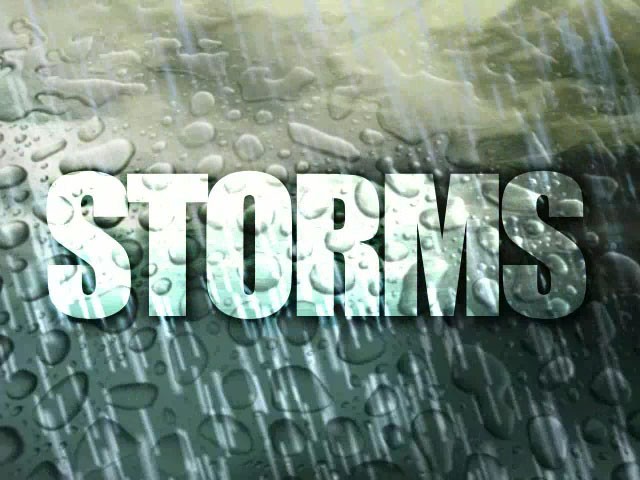A woman was killed in Polk County early Saturday afternoon when a storm demolished her home and threw her and her husband into a field, while an elderly man in neighboring Floyd County was killed by flying debris as he sat in his home, The Atlanta Journal-Constitution reported. Officials have not released the names of either victim.
Calls to the Polk and Floyd County sheriff's departments were not immediately returned.
National Weather Service officials were expected to be in both counties later Sunday to determine whether the damage was caused by a tornado or straight-line winds, meteorologist Vaughn Smith said.
In Atlanta, crews began cleaning up debris and broken glass Saturday from the tornado that struck the city with little warning the previous night. The storm cut a 6-mile path of destruction through the city with winds gusting up to 130 miles per hour, leaving homes crushed by hundreds-year-old trees and numerous windows shattered in high-rise office buildings and hotels downtown.
In neighborhoods just east of downtown - like the historic Cabbagetown where a loft apartment building partially collapsed and homes were destroyed - residents ducked under tables and hid in closets as the twister made its way through the city.
"It was just like everyone says it is - the proverbial freight train," said Carol Grizzel as she cleaned debris out of the yard of her Cabbagetown home early Saturday morning.
Some of the cleanup in the city was delayed by a series of strong storms that moved through the state Saturday, bringing torrential rain, high winds and quarter-sized hail.
Residents had about eight minutes of warning before the twister struck downtown Friday night, weather officials said. The tornado, classified as an EF2 tornado on the Enhanced Fujita scale, lasted about 20 minutes and left broken glass, furniture, tree branches, power lines and other debris strewn onto the streets.
Many residents were surprised by the storm, as were basketball fans at the Southeastern Conference basketball tournament at the Georgia Dome and the NBA matchup between the Atlanta Hawks and Los Angeles Clippers at Philips Arena, since the warning was not displayed at either game.
At least 27 people were hurt Friday night, though no injuries were believed to be life-threatening.
Atlanta Mayor Shirley Franklin declared a state of emergency in the city Saturday and curious onlookers fanned out across the city taking pictures and surveying the damage in their neighborhoods.
Georgia Insurance and Safety Fire Commissioner John Oxendine estimated damage from Friday night's storm at $150 million to $200 million. He said at least $100 million of the damage was at the Georgia World Congress Center, a state convention facility near the CNN Center and the Georgia Dome.
He said the storm broke through the roof, sucking walls, glass and furnishings out like a vacuum.
"Had the building been occupied by a significant number of people, you would probably have had major injuries and loss of life," he said.
The storm smashed hundreds of skyscraper windows, blew furniture and luggage out of hotel rooms, crumbled part of an apartment building and rattled a packed sports arena.
Streets around the Georgia Dome, Phillips Arena, the CNN Center and Centennial Olympic Park were littered with broken glass, downed power lines, crumbled bricks, insulation and the occasional office chair. Billboards collapsed onto parked cars.
CNN said its headquarters building suffered ceiling damage that allowed water to pour into the atrium, and windows were shattered in the CNN.com newsroom and the company's library. A water line inside the building broke, turning a staircase into a waterfall.
"It was crazy. There was a lot of windows breaking and stuff falling," said Terrence Evans, 23, a valet who was outside the Omni Hotel, which adjoins the CNN Center, when the storm twister hit.
Although a tornado warning was issued, there was no announcement of the approaching storm for the 18,000 fans inside the Georgia Dome for the Southeastern Conference basketball tournament. The first sign was rumbling and the rippling of the fabric roof. Catwalks swayed and insulation rained down on players during overtime of the Mississippi State-Alabama game, sending fans fleeing toward the exits and the teams to their locker rooms.
"I thought it was a tornado or a terrorist attack," said Mississippi State guard Ben Hansbrough, whose team won 69-67 after an hourlong delay under a roof with at least two visible tears. A later game between Georgia and Kentucky was postponed. SEC officials said the tournament's remaining games would be played at Georgia Tech.
A spokesman for the Omni Hotel said guests and staff were quickly moved to the exhibit hall and ballroom and that the only injuries were "some cuts and scrapes and no major issues as far as we know."
Power was knocked out to about 19,000 customers, and most had their power restored by Saturday night, said Jeff Wilson, a spokesman with Georgia Power.
The Fulton Cotton Mill Lofts in Cabbagetown had severe damage to one corner and appeared to have major roof damage. Atlanta Fire Department spokesman Capt. Bill May said on Saturday that authorities had searched through the night to ensure that no one was trapped in the building, and were slowed by the darkness and unsafe environment.
The National Oceanic and Atmospheric Association said the last tornado to hit a major city's downtown was on Aug. 12, 2004, in Jacksonville, Fla. Downtown tornadoes have also struck Fort Worth, Texas; Salt Lake City; Little Rock, Ark.; and Nashville, Tenn., in the past decade.
This was the first tornado on record in downtown Atlanta, weather officials said. The last tornado to strike inside the city was in 1975, and it hit the governor's mansion north of downtown.

http://accesswdun.com/article/2008/3/208035
